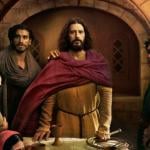In recent weeks I have reading the excellent Moving Beyond the Bible to Theology book by Zondervan and highlighting the views of each model-contributor – this time around it is Kevin Vanhoozer (following Walt Kaiser and Dan Doriani).
Vanhoozer, unlike the other authors in the first part of this book, is first-and-foremost trained as a theologian- and a darn good one at that, as I can see. The others are primarily Biblical scholars. So, his approach is different. He takes a wider perspective on all these issues, but he never plays fast and loose with ‘proof-texts’. As a hopeful biblical scholar (read here: lifelong student), I hope to see more ‘theologians’ handle biblical texts as carefully as he does in this book.
OK, so Vanhoozer advocates a Drama-of-Redemption model. He begins by urging Christians to see living ‘biblically’ as something different than counting up the commands in the Bible and ‘doing’ them. Rather, ‘living biblically’ is a matter of ‘cognition, affection, and imagination…’ and that it is a ‘community project’ (p. 153).
Vanhoozer (hereon “V”) explains that we may be doing it wrong to take the Bible as if it were a rulebook for ethics. Rather, V prefers the analogy of a drama – a “theodrama.”
The sacred page [i.e. Scripture] exists to direct our attention to the divine play….Theology is merely the shadow cast by the theodrama; God’s doing–God’s speech and action– is prior to the church’s response. The gospel that assembles the church is a divine comedy in which followers of Jesus Christ have a privilege and responsibility to take part (p. 156).
Here is V’s definition of the DoR approach which
affirms God’s actions in history, preserves the emphasis on story, and incorporates a canonically attuned, wisdom-oriented “chastened” principlizing, while better integrating the interpreters into the action…[U]nderstanding is a matter not only of cognition but of action. (159).
Believers all, in any and every generation, are called to perform their part in the drama. Here are V’s guiding questions for eager actors.
1. Where are we in the theodrama? What kind of scene are we playing?
2. Who are we? In what kind of plot are our lives entangled?
3. What time is it? What act and scene of the drama of redemption are we playing?
4. What is happening? What is God doing?
5. What we say or do?
(see pp. 162-3).
You will notice, and V makes it no secret, that he is influenced by NT Wright’s interest in narrative,
So, how does the drama work? For V, Scripture does not offer the script to the drama; rather, ‘we perform…the world/theodrama that the text/script presupposes, entails, and implies’ (p. 166).
As I gather, V means that you do not read the Bible to know what to do, but how the world works, how God has worked in the world, and how we can realize his hope for the renewal of the world (my words, not his). V says, biblical interpretation involves ‘renewing and transforming people’s habits of seeing, thinking, and acting…[Scripture] is…a medium of divine communicative action whose purpose is not only to inform but to transform: to nurture right vision, right attitudes, right action.’ (p. 171).
How to act out the theodrama takes, what V calls, “canon sense,” what is ‘right and meet’ with Scripture. He calls this: ‘fittingness.’
Here are his principles for fittingness.
1. Determine who is speaking and how what they are doing with their words relates to the main idea and action of the whole triune drama.
2. Know who, when, and where you are in the drama.
3. Put on the canonical spectacles of faith in order to see, judge, and act in the spectacle of faith now playing in a world theater near you.
Vanhoozer has more to say. Much more, so I will leave you to it. But this is a teaser. He is so articulate and poetic – his words have real power because he is a master communicator. However, I fear that those of us with very empirical historical-critical training will read this chapter and scratch our heads: huh?
Here is Walt Kaiser’s response:
After reading and rereading Kevin’s chapter many times over, for the life of me I cannot explain to anyone else, much less myself, how the “drama-of-redemption approach” works or really solves any of the crucial questions being put to the Bible in our day.
Again, while Vanhoozer offered a very rich essay on what the Bible is, his answer to those wondering about doing ethics and theology in light of the Bible is very complex. Do we look for a simple method that makes sense, but can seem overly simplistic and can lead to multiple conclusions (such as Kaiser’s principlizing method); or do we try a more theological dense method that is very hard to grasp, takes a lot of explaining, and will only finally be accessible to a few bright theologians? I must say that Vanhoozer’s chapter received, so far, the least criticism. But was that because the other contributors liked it or didn’t quite get it and weren’t as honest as Kaiser in saying it out loud (or on paper)?
Ok, maybe it was just Walt and me. I will reread Vanhoozer, and I would be tempted to say that he is probably closest to the most accurate answer. I think that there must be a better way to make what he says obviously right. Well, more to come on following chapters.
Again – I can’t emphasize this enough – this is one of the most important books I have ever read on how Christian use and interact with their Bibles. Also, the contributors were chosen very carefully and all have made excellent points. Clealry a lot of work went into this book, from beginning to end, and it is worth it. A must-read and one that you will not able to put down.















